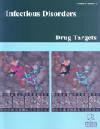-
s Targeting RSV with Vaccines and Small Molecule Drugs
- Source: Infectious Disorders - Drug Targets, Volume 12, Issue 2, Apr 2012, p. 110 - 128
-
- 01 Apr 2012
Abstract
Respiratory syncytial virus (RSV) is the most significant cause of pediatric respiratory infections. Palivizumab (Synagis®), a humanized monoclonal antibody, has been used successfully for a number of years to prevent severe RSV disease in at-risk infants. However, despite intense efforts, there is no approved vaccine or small molecule drug for RSV. As an enveloped virus, RSV must fuse its envelope with the host cell membrane, which is accomplished through the actions of the fusion (F) glycoprotein, with attachment help from the G glycoprotein. Because of their integral role in initiation of infection and their accessibility outside the lipid bilayer, these proteins have been popular targets in the discovery and development of antiviral compounds and vaccines against RSV. This review examines advances in the development of antiviral compounds and vaccine candidates.


